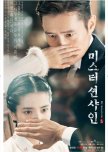An Unforgettable Historical Journey. My Entry into historical drama
Foreword:
Reviewing a historical drama that depicts actual events is tricky business. My approach to "Mr. Sunshine" centers firmly on its unforgettable cast, who were stamped into my mind long after the credits rolled. Even a year later, this show lives rent-free in my head, a testament to its staying power.I haven't even felt the need for a re-watch; it's just there.
"Mr. Sunshine" was my entry point into the world of historical K-dramas. Perhaps not the smoothest introduction, given its immediate intensity, but I stumbled in blindly, back in the days when Netflix recommendations were my guiding star. The series kicks off at a hundred miles an hour, not quite what you'd expect, yet for anyone familiar with military narratives, it's clear you're in for an epic ride.
Eugene Choi:
Born into the harsh reality of Joseon slavery, He escapes to America after a childhood trauma, only to return years later as a Captain in the US Marine Corps. Lee Byung-hun's portrayal of Eugene Choi is so seamless, it's hard to separate actor from character. From a dark past, he finds himself on a ship to an unknown land, eventually rising through the military ranks. Despite his success, his homeland calls him back. The very vessel that once carried a frightened boy now sails him towards an unstable Joseon, a land that showed his parents no kindness. What awaits him? War? Desolation? Liberation? Or perhaps, an unexpected love? Shielded by a foreign flag, he's caught between personal comfort and his motherland's salvation.
Go Ae-shin:
An orphaned noblewoman, secretly a sharp-shooting sniper for the Righteous Army, fiercely battling for Korea's independence against a possible Japanese colonization. Beneath her elegant hanboks, a warrior princess resides. By day, she's a picture of grace; by night, she commands a silent, formidable force unknown even to the most ruthless. She embodies the very spirit of the struggle.Joseon found its own Joan of Arc in Go Ae-shin. Kim Tae-ri's performance captures every sentiment, soft, tough, and everything in between – until she encounters Eugene Choi, forcing her to completely recalibrate her life's trajectory, like a GPS that's suddenly lost its data.
Gu Dong-mae (Ishida Sho):
A truly complex figure who constantly keeps you guessing. Raised on the "other side of the river," You only need to read his adoptive name to know which side of history he is standing on, he was my personal headache, not because he was twisted, but because predicting his next move was impossible. He's a man of action, his sword doing all the talking. For the longest time, his allegiance remained a mystery, until the ties of blood proved thicker than water, forcing a choice that ultimately helped the writers neatly wrap up this intricate historical tapestry, leaving us staring at the screen wondering, "Now what?" It was much later I discovered Yoo Yeon-seok, an actor you'd never expect to embody such a ruthless villain, brought this character to life.
Lee Yang-hwa (Kudo Hina):
Adopted by the Japanese, much like Gu Dong-mae, Kudo Hina, though not as overtly ruthless as GDM or the "night runner" princess, possesses a quiet strength. She faces the enemy daily, a smile masking her pain. Her intelligence is her strength; her every move is calculated, making her a puzzle to her adversaries. Kim Min-jung breathes such life into her that, like Eugene Choi's character, it's tough to distinguish where the artist ends and the art begins.
Kim Hui-seong:
The male counterpart to Go Ae-shin. Born into aristocracy, Western-educated, and a very sharp man who carries a hidden burden: a past he desperately tries to escape. His family's wealth funded countless atrocities, enslaving, killing, and exiling many, a direct reason for "Mr. Sunshine's" very existence. He yearns for a quiet, noble life, but family ties and unrequited love constantly pull him back. He's perpetually torn between joining Joseon's fight against a formidable foe or simply ordering another bespoke suit from London's finest tailors. A truly troubled soul.
The paths of these distinct individuals cross as Joseon fights for sovereignty. Every decision brings them closer to an inescapable knot, demanding they either fight or die trying. Bound by a common enemy and a shared destiny, they fall in and out of love, all while navigating the treacherous journey towards freedom.
"Mr. Sunshine" is the kind of drama that, when the credits finally roll, sends you straight to Google, desperate to confirm if any of this could possibly be real. It leaves you with a lingering "hangover" for days. Certain characters cling to your mind, making it hard to move on, hence my year-long delay in pinning this review, yet still recalling every detail as if it were yesterday. While it might not be an easy entry point for historical drama newbies, if you can comfortably watch something like "The Battle of Changsari" late at night, then proceed. The initial intensity gives way to some of the finest cinematography, production, and storytelling I've encountered in recent memory.
Reviewing a historical drama that depicts actual events is tricky business. My approach to "Mr. Sunshine" centers firmly on its unforgettable cast, who were stamped into my mind long after the credits rolled. Even a year later, this show lives rent-free in my head, a testament to its staying power.I haven't even felt the need for a re-watch; it's just there.
"Mr. Sunshine" was my entry point into the world of historical K-dramas. Perhaps not the smoothest introduction, given its immediate intensity, but I stumbled in blindly, back in the days when Netflix recommendations were my guiding star. The series kicks off at a hundred miles an hour, not quite what you'd expect, yet for anyone familiar with military narratives, it's clear you're in for an epic ride.
Eugene Choi:
Born into the harsh reality of Joseon slavery, He escapes to America after a childhood trauma, only to return years later as a Captain in the US Marine Corps. Lee Byung-hun's portrayal of Eugene Choi is so seamless, it's hard to separate actor from character. From a dark past, he finds himself on a ship to an unknown land, eventually rising through the military ranks. Despite his success, his homeland calls him back. The very vessel that once carried a frightened boy now sails him towards an unstable Joseon, a land that showed his parents no kindness. What awaits him? War? Desolation? Liberation? Or perhaps, an unexpected love? Shielded by a foreign flag, he's caught between personal comfort and his motherland's salvation.
Go Ae-shin:
An orphaned noblewoman, secretly a sharp-shooting sniper for the Righteous Army, fiercely battling for Korea's independence against a possible Japanese colonization. Beneath her elegant hanboks, a warrior princess resides. By day, she's a picture of grace; by night, she commands a silent, formidable force unknown even to the most ruthless. She embodies the very spirit of the struggle.Joseon found its own Joan of Arc in Go Ae-shin. Kim Tae-ri's performance captures every sentiment, soft, tough, and everything in between – until she encounters Eugene Choi, forcing her to completely recalibrate her life's trajectory, like a GPS that's suddenly lost its data.
Gu Dong-mae (Ishida Sho):
A truly complex figure who constantly keeps you guessing. Raised on the "other side of the river," You only need to read his adoptive name to know which side of history he is standing on, he was my personal headache, not because he was twisted, but because predicting his next move was impossible. He's a man of action, his sword doing all the talking. For the longest time, his allegiance remained a mystery, until the ties of blood proved thicker than water, forcing a choice that ultimately helped the writers neatly wrap up this intricate historical tapestry, leaving us staring at the screen wondering, "Now what?" It was much later I discovered Yoo Yeon-seok, an actor you'd never expect to embody such a ruthless villain, brought this character to life.
Lee Yang-hwa (Kudo Hina):
Adopted by the Japanese, much like Gu Dong-mae, Kudo Hina, though not as overtly ruthless as GDM or the "night runner" princess, possesses a quiet strength. She faces the enemy daily, a smile masking her pain. Her intelligence is her strength; her every move is calculated, making her a puzzle to her adversaries. Kim Min-jung breathes such life into her that, like Eugene Choi's character, it's tough to distinguish where the artist ends and the art begins.
Kim Hui-seong:
The male counterpart to Go Ae-shin. Born into aristocracy, Western-educated, and a very sharp man who carries a hidden burden: a past he desperately tries to escape. His family's wealth funded countless atrocities, enslaving, killing, and exiling many, a direct reason for "Mr. Sunshine's" very existence. He yearns for a quiet, noble life, but family ties and unrequited love constantly pull him back. He's perpetually torn between joining Joseon's fight against a formidable foe or simply ordering another bespoke suit from London's finest tailors. A truly troubled soul.
The paths of these distinct individuals cross as Joseon fights for sovereignty. Every decision brings them closer to an inescapable knot, demanding they either fight or die trying. Bound by a common enemy and a shared destiny, they fall in and out of love, all while navigating the treacherous journey towards freedom.
"Mr. Sunshine" is the kind of drama that, when the credits finally roll, sends you straight to Google, desperate to confirm if any of this could possibly be real. It leaves you with a lingering "hangover" for days. Certain characters cling to your mind, making it hard to move on, hence my year-long delay in pinning this review, yet still recalling every detail as if it were yesterday. While it might not be an easy entry point for historical drama newbies, if you can comfortably watch something like "The Battle of Changsari" late at night, then proceed. The initial intensity gives way to some of the finest cinematography, production, and storytelling I've encountered in recent memory.
Was this review helpful to you?


 4
4 1
1 1
1 2
2





















